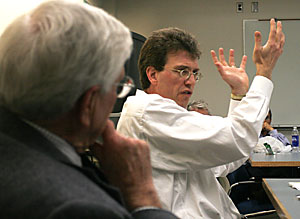 |
|
MATT ROBLES / Arizona Daily Wildcat
|
Mark Chaves, head of the sociology department, clarifies the realities behind controversies about public funding of faith-based social services.
|
|
|
By Djamila Noelle Grossman
Arizona Daily Wildcat
Tuesday, February 8, 2005
Print this
Whether governmental funding of religious-based social services is justified was the topic of conversation yesterday regarding the separation of church and state, both literally and financially.
Mark Chaves, professor and head of the sociology department, addressed controversies about the work of religious organizations and their efforts to receive government funds for social services
There have been efforts to direct more public funds to religious organizations that do social services, he said.
However, he said it is unclear if the increase in funding will affect the separation between church and state.
"There are lots of things about our social system that aren't working. We need new ideas," Chaves said. "This is a new idea. A genuine belief in religious ethic."
Chaves associates the increased funding of faith-based organizations with the Bush administration and the president's willingness to support the church, he said.
"What's new is there is this extra energy of assumption that religious organizations are going to receive funding," Chaves said.
He said the "black and the liberal churches" have done the greatest amount of social work, as opposed to the "white, conservative church," who are supported the most by the government, but do not contribute as much to social services.
Even though he named several reasons for funding, he did not explicitly criticize or approve of it.
"There is no evidence that religious groups perform better care than non-religious groups," Chaves claimed.
While religious organizations often do a better job with elder care because they use less medicine, they are normally worse in child care, he said.
Other differences include emergency situations where the church provides imminent relief such as providing food and clothes, and professional care can offer more long-term help, Chaves said.
Chaves said despite the myth that religious organizations are discriminated when competing for grants with non-religious organizations, communication between government and the church functions well.
In addition, he said many organizations try to emphasize their religious faith, such as the Salvation Army, who, in 2003 began requiring employees to be a member of the church.
Shawna Anderson, a sociology graduate student, liked the way Chaves approached the topic.
"I thought it was enlightening," Anderson said. "I had a good idea of what was going on."
Christine Sheikh, a sociology graduate student, said she found the data provided about social issues and politics very useful. Sheikh said she also liked the worksheet showing the myths about religious organizations.
"I was excited to come in and see that you can take it and say this is a myth," Sheikh said.
